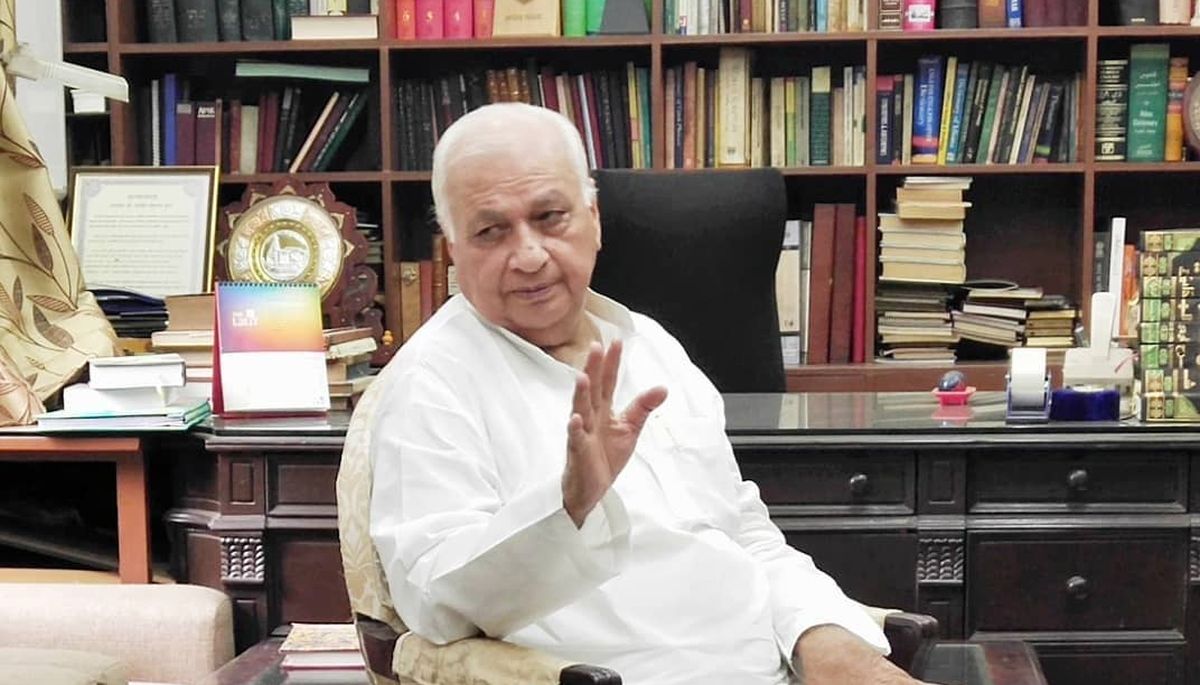Governor Arif Mohammad Khan must stop harassing this "distinguished historian" immediately, said the historians backing Gopinath Ravindran.

Kerala Governor Arif Mohammed Khan. (Supplied)
Over 50 historians have taken up cudgels against Kerala Governor Arif Mohammad Khan after he recently called Kannur University Vice-Chancellor Professor Gopinath Ravindran a criminal.
They said in a statement that Ravindran was “one of India’s leading historians, with a particular specialisation in the agrarian history of Kerala and historical demography”.
They added that the “false, defamatory, and politically motivated campaign” against the vice-chancellor by Khan — who as governor is also the chancellor of the university — was “unacceptable”.
“The governor must stop this harassment of a distinguished historian and vice-chancellor immediately,” they said in the statement issued through Prof Amar Farooqui of the Department of History at the University of Delhi.
Khan has time and again claimed that Ravindran instigated a heckling against him at Kannur University on 28 December, 2019, when he arrived there to inaugurate the 80th edition of the Indian History Congress.
However, those who took part in the event vehemently denied the charge and confirmed that Ravindran was not even part of the protests that Khan faced for repeating the BJP stand on the Citizenship Amendment Act (CAA).
According to them, the vice-chancellor was in fact seen trying to pacify historian Irfan Habib and others who raised their objections when Khan put aside the prepared text for the inaugural speech and engaged in extempore responses to some of the earlier speakers, who incidentally included then CPI(M) Rajya Sabha member KK Ragesh.
Currently private secretary to Kerala Chief Minister Pinarayi Vijayan, Ragesh is now in the thick of the political controversy, with Khan freezing the appointment of his wife Priya Varghese as an associate professor of Malayalam in the university, alleging nepotism.
Biju Kandakai, a University Syndicate member who was present at the History Congress, told South First that whatever happened during the inauguration was spontaneous, and no part of the protest was planned.
He added that there was no physical assault either. Even the picture released by Khan on Twitter at that time showed Ravindran holding back and pacifying Irfan Habib.
“The remarks by Khan are unbecoming of a person who holds a constitutional position. The Governor has to make it clear whether Ravindran was involved in any criminal activity at any point in time,” said MV Jayarajan, a district secretary of the CPI(M), when contacted by South First.
“The protests at the event were natural and spontaneous as the Governor was the most powerful voice in Kerala on the CAA and the contentious farm laws. The vice-chancellor is a historian of repute with strong secular credentials. It would be natural for the BJP-appointed Governor to turn against him,” said Jayarajan.
Ragesh and Kandakai used their speeches at the inauguration of the History Congress to criticise the Centre’s attempts to distort history and rewrite it, ignoring the positive contributions of minorities and secular formations. They also referred to nationwide protests against the CAA and called the controversial farm laws draconian.
Kandakai said Khan sought a pen and pad when Ragesh was delivering his speech. University officials confirmed that Khan started his speech soon after Amiya Kumar Bagchi, the newly-elected chair of the Congress.
Per protocol, Khan was allowed to speak for 31 minutes, one minute more than Bagchi.
Instead of reading out his prepared speech, the Governor went extempore and reacted to the opinions of early speakers. At one point, he even reminded Ragesh that he was rebutting his comments.
When Khan disapproved of protests against the CAA and farm laws and blindly justified the Centre’s policy over them, a few of the participants started protesting.
Some JNU and Jamia Millia Islamia students stood up and voiced their reservations, reminding Khan about his early comment that the venue was open for any discussions.
The trouble started when security personnel tried to evict the students. The police forcibly took many protestors to a nearby police station and released them much later.
Those who took part in the event recalled the atmosphere charged when Khan started quoting Maulana Abul Kalam Azad out of context to slander the protesting students.
Khan quoted Azad and said some potholes were left behind though the Partition took most of the dirt away. The potholes remain filled with dirty water, so they are now stinking, Khan reportedly said, leading to the protests.
When he equated those who were protesting against him with the cause of the foul smell and quoted Azad again to justify the comment, historian Irfan Habib — who was on the stage as outgoing president of the History Congress — stood up and asked him to quote Nathuram Godse instead of Azad or Gandhi.
Ravindran stopped Habib when he attempted to approach Khan with more questions. The vice-chancellor also requested the Governor to refrain from using the event as a political platform.
As Habib continued his attempts to approach Khan, the Governor’s security officers pushed him away.
Subsequently, Khan accused Habib of trying to stop him from speaking.

Jul 26, 2024

Jul 26, 2024

Jul 25, 2024

Jul 25, 2024

Jul 25, 2024

Jul 24, 2024